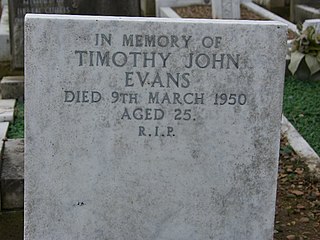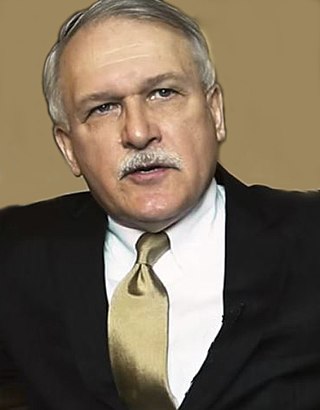Related Research Articles
An expert witness, particularly in common law countries such as the United Kingdom, Australia, and the United States, is a person whose opinion by virtue of education, training, certification, skills or experience, is accepted by the judge as an expert. The judge may consider the witness's specialized opinion about evidence or about facts before the court within the expert's area of expertise, to be referred to as an "expert opinion". Expert witnesses may also deliver "expert evidence" within the area of their expertise. Their testimony may be rebutted by testimony from other experts or by other evidence or facts.
The Reid technique is a method of interrogation. The system was developed in the United States by John E. Reid in the 1950s. Reid was a polygraph expert and former Chicago police officer. The technique is known for creating a high pressure environment for the interviewee, followed by sympathy and offers of understanding and help, but only if a confession is forthcoming. Since its spread in the 1970s, it has been widely utilized by police departments in the United States.

Edward Hirsch Levi was an American legal scholar and academic. He served as dean of the University of Chicago Law School from 1950 to 1962, president of the University of Chicago from 1968 to 1975, and then as United States Attorney General from 1975 to 1977 under President Gerald Ford. Levi is regularly cited as the "model of a modern attorney general", the "greatest lawyer of his time", and is credited with restoring order after Watergate. He is considered, along with Yale's Whitney Griswold, the greatest of postwar American university presidents.
Together, legal psychology and forensic psychology form the field more generally recognized as "psychology and law". Following earlier efforts by psychologists to address legal issues, psychology and law became a field of study in the 1960s as part of an effort to enhance justice, though that originating concern has lessened over time. The multidisciplinary American Psychological Association's Division 41, the American Psychology–Law Society, is active with the goal of promoting the contributions of psychology to the understanding of law and legal systems through research, as well as providing education to psychologists in legal issues and providing education to legal personnel on psychological issues. Further, its mandate is to inform the psychological and legal communities and the public at large of current research, educational, and service in the area of psychology and law. There are similar societies in Britain and Europe.

A miscarriage of justice occurs when an unfair outcome occurs in a criminal or civil proceeding, such as the conviction and punishment of a person for a crime they did not commit. Miscarriages are also known as wrongful convictions. Innocent people have sometimes ended up in prison for years before their conviction has eventually been overturned. They may be exonerated if new evidence comes to light or it is determined that the police or prosecutor committed some kind of misconduct at the original trial. In some jurisdictions this leads to the payment of compensation.
A false confession is an admission of guilt for a crime which the individual did not commit. Although such confessions seem counterintuitive, they can be made voluntarily, perhaps to protect a third party, or induced through coercive interrogation techniques. When some degree of coercion is involved, studies have found that subjects with highly sophisticated intelligence or manipulated by their so-called "friends" are more likely to make such confessions. Young people are particularly vulnerable to confessing, especially when stressed, tired, or traumatized, and have a significantly higher rate of false confessions than adults. Hundreds of innocent people have been convicted, imprisoned, and sometimes sentenced to death after confessing to crimes they did not commit—but years later, have been exonerated. It was not until several shocking false confession cases were publicized in the late 1980s, combined with the introduction of DNA evidence, that the extent of wrongful convictions began to emerge—and how often false confessions played a role in these.
Paul D. Gewirtz is an American lawyer currently serving as the Potter Stewart Professor of Constitutional Law at Yale Law School and director of the Yale Paul Tsai China Center.

David Pietrusza is an American author and historian, and is considered an expert on US Politics in the 1920s.
Rob Warden is a Chicago legal affairs journalist and co-founder of three organizations dedicated to exonerating the innocent and reforming criminal justice: the Center on Wrongful Convictions at Northwestern University Pritzker School of Law, the National Registry of Exonerations at the University of California-Irvine, and Injustice Watch, a non-partisan, not-for-profit, journalism organization that conducts in-depth research exposing institutional failures that obstruct justice and equality. As an investigative journalist in the 1970s, he began focusing on death penalty cases, which led to a career exposing and publicizing the injustices and misconduct in the legal system. Warden's work was instrumental in the blanket commutation of death row cases in Illinois in 2003 and in the abolition of the Illinois death penalty in 2011.
Richard Jason Ofshe is an American sociologist and professor emeritus of sociology at the University of California, Berkeley. He is known for his expert testimony relating to coercion in small groups, confessions, and interrogations.
Michael Mark Welner is an American forensic psychiatrist and Chairman of The Forensic Panel. Welner is best known for his work in sensitive and complex litigation. He has acted as lead forensic psychiatric examiner in numerous criminal or court proceedings of national and international prominence, including precedent-setting trials and higher court decisions. Welner is also known for a number of innovations in forensic science, forensic psychiatry and justice, including protocols for prospective peer review in forensic medicine consultation, research to standardize an evidence-based distinction of the worst crimes, The Depravity Standard, and recommendations for upgrading forensic science assessment. He has been featured in network television news coverage of forensic psychiatry issues, has authored publications for professional and public audiences, and has contributed to emerging legislation on mental health reform.
Saul Kassin is an American academic, who serves as a professor of psychology at the City University of New York's John Jay College of Criminal Justice and Massachusetts Professor Emeritus of Psychology at Williams College in Williamstown, Massachusetts.
Michael J. Gerhardt is the Samuel Ashe Distinguished Professor of Constitutional Law at the University of North Carolina School of Law in Chapel Hill. He is also the director of the Center on Law and Government at the University of North Carolina at Chapel Hill and is an expert on constitutional law, separation of powers, and the legislative process. He is a Scholar in Residence at the National Constitution Center and visiting scholar at the University of Pennsylvania Law School. On December 2, 2019, it was announced that Gerhardt would testify before the House Judiciary Committee regarding the constitutional grounds for presidential impeachment in the impeachment inquiry against Donald Trump.

Dean Tong is an American author, public speaker, consultant, and trial expert in the field of false child abuse allegations. He has consulted for the media on cases such as that of Elian Gonzalez. He is the author of three books inspired by his personal experience with being accused of child abuse in 1985. In addition to testifying as an expert witness, he has appeared on radio talk shows and television speaking on the topic of false abuse accusations. He has also been quoted by publications on the topic including by the Chicago Defender, The Virginian-Pilot, The Boston Globe, and The Denver Post.
Roger Wellington Shuy is an American linguist best known for his work in sociolinguistics and forensic linguistics. He received his BA from Wheaton College in 1952, his MA from Kent State University in 1954, and his PhD from Case Western Reserve University in 1962, where he studied regional dialectology with Raven I. McDavid, Jr. Shuy took additional linguistic courses at the University of Michigan and Indiana University.
Eduardo M. Peñalver is an American law professor who is the president of Seattle University. From 2014 until 2021, Peñalver was the 16th dean of Cornell Law School.
Brendan Ray Dassey is an American convicted murderer from Manitowoc County, Wisconsin, who at 16 confessed to being a party to first-degree murder, mutilation of a corpse, and second-degree sexual assault. He was sentenced to life in prison with the earliest possibility of parole in 2048. His videotaped interrogation and confession, which he recanted before trial, substantially contributed to his conviction. Parts were shown, but much was left out, in the Netflix documentary series Making a Murderer (2015). The series examined the 2005–2007 investigation, prosecution, and trials of Dassey and his uncle, Steven Avery, both of whom were convicted of murdering the photographer Teresa Halbach on October 31, 2005.
Laura E. Little is an American legal scholar and author, specializing in conflict of laws, federal courts, humor and the law, the law of freedom of expression, and constitutional law. She is the James G. Schmidt Professor of Law at Temple University School of Law.
Brad Evans is a British academic, and Professor of Political Violence at the department of Politics, Languages & International Studies at the University of Bath, United Kingdom. He is the founder and director of the Centre for the Study of Violence.
On May 7, 2017, 18-year-old Brooke Skylar Richardson gave birth at home and buried her newborn daughter in the backyard of her parents' house in Carlisle, Ohio. Two months later, she described what had happened to her doctor, who reported the incident to police. Richardson was acquitted of charges of aggravated murder, child endangerment and involuntary manslaughter. She was found guilty of abuse of a corpse and received three years probation, which was ended early by the court.
References
- ↑ "EXPERT TESTIMONY". June 9, 2023.
- ↑ Knight, Keith BieryGolick and Cameron. "Ex-cheerleader accused of killing newborn found not guilty on most serious charges". USA TODAY.
- ↑ "A Short History of Presidential Election Crises, (And How to Prevent the Next One) (description)". www.citylights.com.